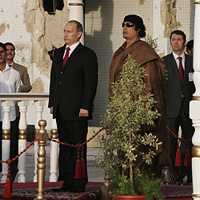The Russian government has effectively managed to balance its competing interests regarding Libya, despite having much less influence on events there than many other governments.
The Russian delegation to the U.N. Security Council (UNSC) voted to impose sanctions against Moammar Gadhafi's regime for its violent suppression of peaceful demonstrators, but abstained on the crucial March 17 vote authorizing the use of force to protect civilians from the Libyan government. Russia's U.N. ambassador, Vitaly Churkin, said that Moscow could not support the resolution since it lacked clearly defined limits on using military force.
After Western countries initiated wide-ranging military operations against Gadhafi's' troops, Russian officials complained that they were exceeding permissible levels of force. Foreign Ministry spokesman Alexander Lukashevich further castigated Western governments for using the UNSC resolution to justify attacks against "nonmilitary" targets that caused dozens of civilian deaths. Meanwhile, Foreign Minister Sergey Lavrov said that casualties caused by NATO's use of force were just as "unacceptable" as those committed by Gadhafi's forces. Lavrov also warned that Western military intervention risked fueling international terrorism. Russian officials are now urging Western governments not to arm the Libyan insurgents, a step Moscow argues exceeds what is permitted by the UNSC resolutions.

